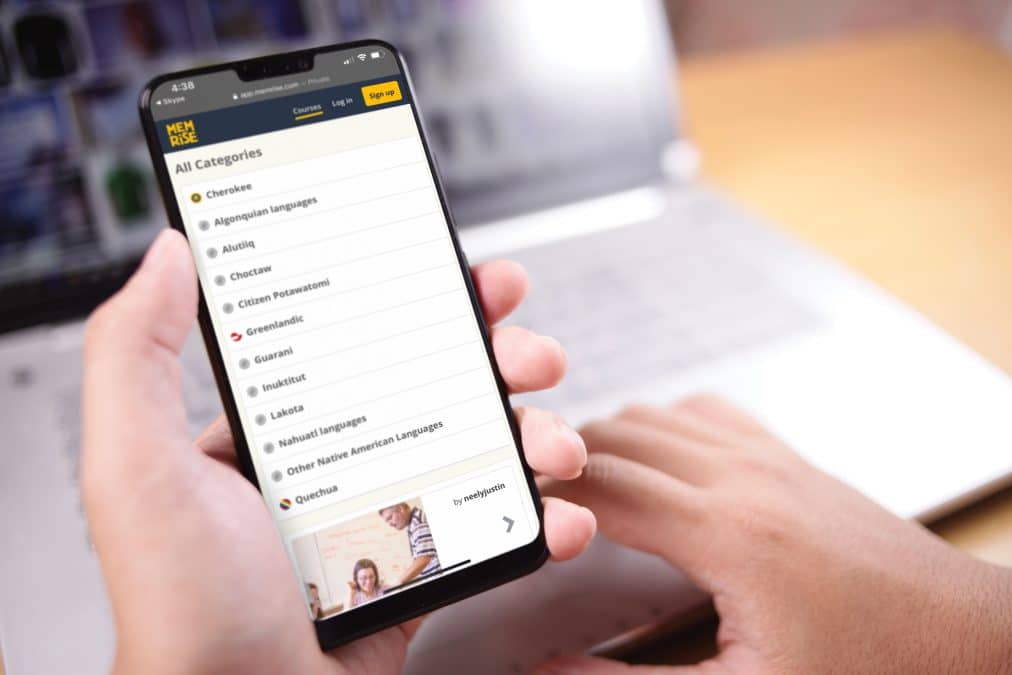Native American Heritage Month is a great time to begin learning Bodéwadmimwen as a family. Although mastering the language has its difficulties, picking a few words and using them with younger generations helps ensure Bodéwadmimwen stays alive and strong for years to come.
“When I first heard (Potawatomi), it kind of took its own form inside me, and that’s what I feel that it does for people. They hear a word and they may get that word, and then they want another, and they just keep growing and growing,” said Robert Collins, Citizen Potawatomi Department of Language aid.
Collins began learning Bodéwadmimwen through prayer and songs during mdodogemek (sweat lodge) a few years ago. Today, he teaches children at the CPN Child Development Center and uses the language at home with his son, Robert Collins II.
“It is very important to me for (the language) to be handed down to my descendants,” Collins said.

Overcoming hesitations
Before written word, Potawatomi culture and language passed from generation to generation only through oral traditions, and continuing that is still important today. Learning Potawatomi requires verbally using the words. Wanting to show respect and speaking correctly is important, but Collins said part of the process includes making mistakes.
“Just like when you were learning to speak English when you were an infant, you missed a word and didn’t even care you were messing up words,” he said. “You have to kind of look at it like that way. It’s OK to mess up. We’re human.”
Collins speaks Potawatomi as much as possible in his home, and although his son does not always respond in Potawatomi, he understands his father’s words. Collins encourages other Potawatomi to do the same.
Resources
“It takes that dedication, and if you want it, you’ll get it,” Collins said.
When beginning his Bodéwadmimwen journey, he took the online Moodle course created by the CPN Department of Language, and his son began the course this summer as a way to help transition into distance learning for the upcoming school year.
“You’ve got to remember that our ancestors are right there with us with this language, whether you realize it or not,” he said. “You can kind of begin to see the world as they’ve seen it.”
The dictionary at potawatomidictionary.com is also another great resource. It features numerous audio recordings, and pronunciations along with definitions to provide a greater opportunity to master Potawatomi.
“And the historical audio — it’s something to hear elders that have probably walked on. They’re no longer here to speak with us, but we have audio of them too. So, that’s them still helping keep the language alive,” Collins said.
Phone apps like Memrise developed by CPN and Bodwéwadmimwen by the Pokagon Band of Potawatomi offer solutions for on-the-go learning. Some opt for placing sticky-notes around their homes as reminders and to learn everyday phrases like gzinenjek (you all wash your hands), gziyabde’on (brush your teeth), gnoskwedzon (comb your hair) and more.
For Collins, hearing his son and other children he teaches at the Child Development Center use the language brings hope.
“We’re all connected, and when someone picks up the language, it just proves that to me even more,” he said.
The department has also developed songs, cartoons, video recordings and more featured online at cpn.news/JN and cpn.news/langyt.
“You don’t need to be a certain age,” Collins said. “They might be in a kid-kind of platform, but they’re good for kids and adults.”
For many CPN, hearing the language only occurs during Family Reunion Festival and other Potawatomi gatherings. This can create additional challenges, but using the recordings, videos and more created by the CPN Department of Language can bridge this gap and create more familiarity.
Collins stressed that although picking up Bodéwadmimwen can be difficult, there is no time like the present to begin the learning process, regardless of how young or old someone may be. Taking the opportunity to set examples for younger members is important to the survival of Citizen Potawatomi culture, history and lifeways.
“It’s one of those things you don’t want to put off. Don’t think that somebody else is going to do it,” he said.
Access information and resources to begin learning and introducing Bodéwadmimwen to the next generations of Potawatomi at potawatomi.org/language.
